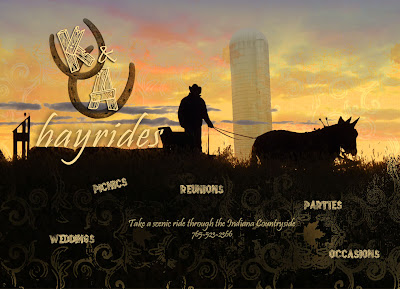Yesterday was a day for paying attention. I took the entire Work Keys exam - again, because it had been five years since I took the last one. Several others just took sections. The proctor graded their sections during the break. One young lady was exhilarated when she learned she'd passed the Locating Information Section - the last requirement she had to fulfill. We all congratulated her, and she wished us all well as we went in to take the last portion of the exam and she got into her car to leave.
After the exam, I went to the McDonald's by Walmart on 26. A delivery guy from Jimmy John's had passed out free sandwiches to everyone at Work One during one of the breaks, so I just got a drink and salad to go along with it. Oh, yes, and cookies. What can I say - taking exams makes me hungry. At 1p I attended a Hub session at Work One - the Hub is part of a program called the Aging Workforce designed to assist displaced older workers primarily.
Next at Ivy Tech, I made a quick restroom stop before my 3p Visual Basic class. Another young woman was on her cell phone with a local childcare agency. She sounded desperate. When she learned that funding had come through, she almost broke into tears of joy. She proclaimed her good news and threw her arms around someone else she evidently knew who happened to be in the restroom. Of course we congratulated her too.
While we were waiting for the instructor to arrive to unlock the computer lab door, two of my classmates were talking, and one mentioned their sitter had gotten licensed and just doubled her fees. I told them about the girl in the restroom. My classmate said they had been on that waiting list for the last year and a half. Boy, I replied, wouldn't it be nice if Ivy Tech had a nursery school where students could just drop off their children, when they had no other childcare resources. My classmate said he'd had to to miss classes in the past when his childcare resource was unavailable or unreliable. He said it would be nice if they offered full time childcare and just added the charge to the rest of the student fees!
A childcare facility would be a great endowment project for some future benefactor of Ivy Tech to take on.
In class, we got down to business, which involved some group work. Another classmate, a quiet young man whom I'd been sitting next to for going on two months now, mentioned that he was tired today, kind of as an apology. We had never really talked much. Today he told me he'd gotten up early - about 4 a to go to work before class. Upon further discussion about our situations, I found out that he works 60 hours a week and goes to school. On top of that, since he is Spanish, he had to learn English and translate all his courses when he first started taking classes two years ago! I'd never really thought about that with programming languages. I said, "Gee, there ought to be a Spanish version of Visual Basic." He also has two children - he laughed when he opened his text and discovered his little girl had stuck stickers all over one of the pages of exercises for him.
This seems to be the week for getting back in touch. I'm going to attend an installation into Phi Theta Kappa for an older friend this evening, and most of my Thursday evenings have been spent at the Democrat Headquarters downtown, calling prospective voters encouraging them to turn out to vote November 2nd. Geez. Since I'm doing all that, I'd better not forget to turn out and vote myself, had I?
JuneBug
Smokey and Bon





